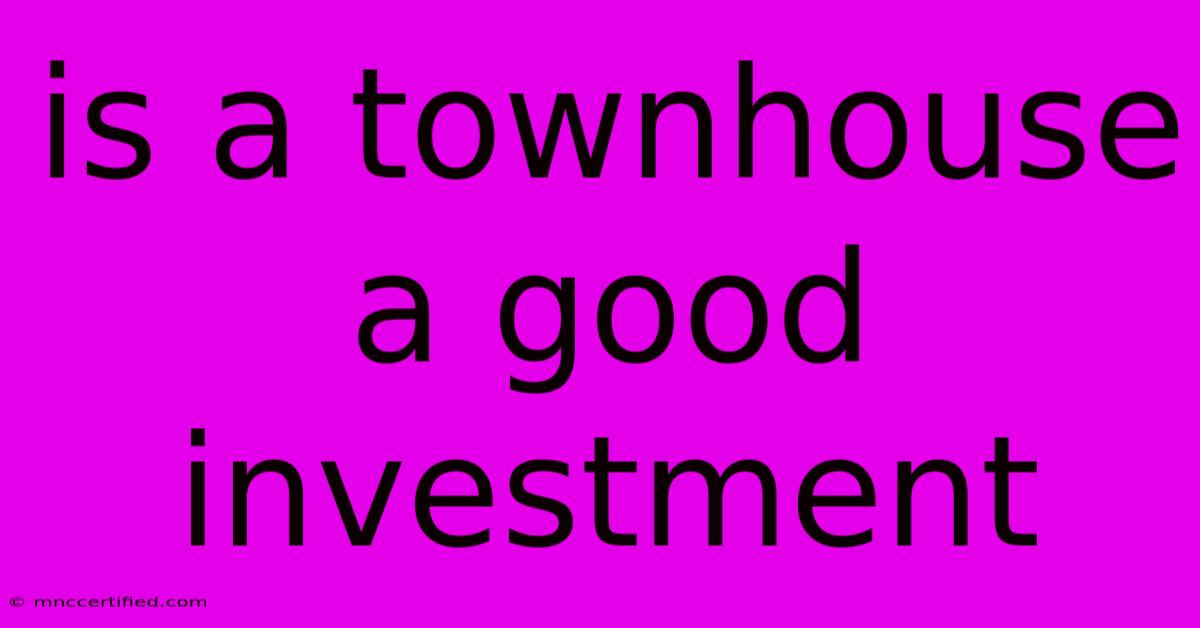Is A Townhouse A Good Investment

Table of Contents
Is a Townhouse a Good Investment? Weighing the Pros and Cons
Buying a townhouse can be a smart financial move, but it's crucial to understand the nuances before diving in. This comprehensive guide explores the pros and cons of townhouse investments to help you make an informed decision. We'll examine factors like appreciation potential, rental income, maintenance costs, and more, providing you with a clear picture of whether a townhouse is the right investment for you.
The Allure of Townhouse Investment: Potential Benefits
Townhouses offer a unique blend of benefits that make them attractive investment properties. Let's explore some key advantages:
1. Lower Purchase Price Compared to Single-Family Homes:
One significant advantage is the often lower purchase price compared to detached single-family homes in the same area. This makes townhouses more accessible, especially for first-time investors or those with a limited budget. This lower barrier to entry can lead to faster equity building.
2. Lower Maintenance Responsibilities (Often):
Unlike detached homes where you're responsible for all exterior maintenance, many townhouse developments handle exterior upkeep, including landscaping, roof repairs, and exterior painting. This reduced maintenance burden translates to lower ongoing costs and less hassle for the owner. Always check your HOA documentation for specifics.
3. Potential for Rental Income:
Townhouses can generate significant rental income, providing a steady stream of passive income. Their smaller size and often more manageable maintenance requirements make them appealing to renters, especially young professionals or couples. Research local rental rates to estimate potential returns.
4. Strong Appreciation Potential in Desirable Locations:
In sought-after neighborhoods, townhouses often experience strong appreciation over time. Factors like location, amenities, and market demand significantly impact appreciation potential. Analyze local market trends before investing.
5. HOA Management Offers Convenience:
Homeowners' Associations (HOAs) handle many aspects of community management, including maintenance, landscaping, and rules enforcement. This convenience can be a significant plus for busy investors, freeing up their time and energy.
The Challenges of Townhouse Ownership: Potential Drawbacks
While townhouses offer many advantages, it's essential to acknowledge potential drawbacks:
1. Limited Space and Customization:
Townhouses typically offer less living space and fewer customization options compared to single-family homes. This can be a drawback for larger families or those who prefer extensive renovations.
2. HOA Fees and Restrictions:
HOA fees can be substantial and increase over time. Furthermore, HOAs often impose strict rules and regulations, which can limit your freedom to modify the property or even choose exterior paint colors. Understanding the HOA's rules and financial stability is vital.
3. Shared Walls and Noise Concerns:
Living in close proximity to neighbors in a townhouse often means sharing walls. This can lead to noise concerns and potential conflicts with neighbors if not managed carefully.
4. Less Privacy Compared to Detached Homes:
The close proximity to neighbors in a townhouse development can result in less privacy compared to a detached home.
5. Potential for Lower Resale Value in Certain Markets:
While appreciation is possible, the resale value of townhouses can be influenced by market conditions and location. In some markets, townhouses may appreciate slower than single-family homes. Thorough market research is key.
Is a Townhouse Right for You? A Checklist for Investors
Before investing in a townhouse, consider these factors:
- Your Budget: Can you comfortably afford the purchase price, HOA fees, property taxes, and potential maintenance costs?
- Your Investment Goals: Are you seeking rental income, long-term appreciation, or a combination of both?
- Your Lifestyle: Do you prefer a low-maintenance lifestyle and the convenience of an HOA? Are you comfortable with shared walls and potential noise?
- Market Research: Have you thoroughly researched the local real estate market to assess appreciation potential and rental rates?
- HOA Details: Have you carefully reviewed the HOA's rules, regulations, and financial stability?
Conclusion:
Whether a townhouse is a good investment ultimately depends on your individual circumstances, financial goals, and risk tolerance. By carefully weighing the pros and cons and conducting thorough research, you can make an informed decision that aligns with your investment strategy. Remember, a well-researched investment increases your chances of success in the real estate market.

Thank you for visiting our website wich cover about Is A Townhouse A Good Investment. We hope the information provided has been useful to you. Feel free to contact us if you have any questions or need further assistance. See you next time and dont miss to bookmark.
Featured Posts
-
Tnf Browns Defeat Steelers
Nov 22, 2024
-
160 000 Pounds Of Ground Beef Recalled
Nov 22, 2024
-
The Villages Insurance Brownwood
Nov 22, 2024
-
Penn State Sorority A Students Journey
Nov 22, 2024
-
Bgt 2024 Bumrahs Four Ind Vs Aus Live
Nov 22, 2024